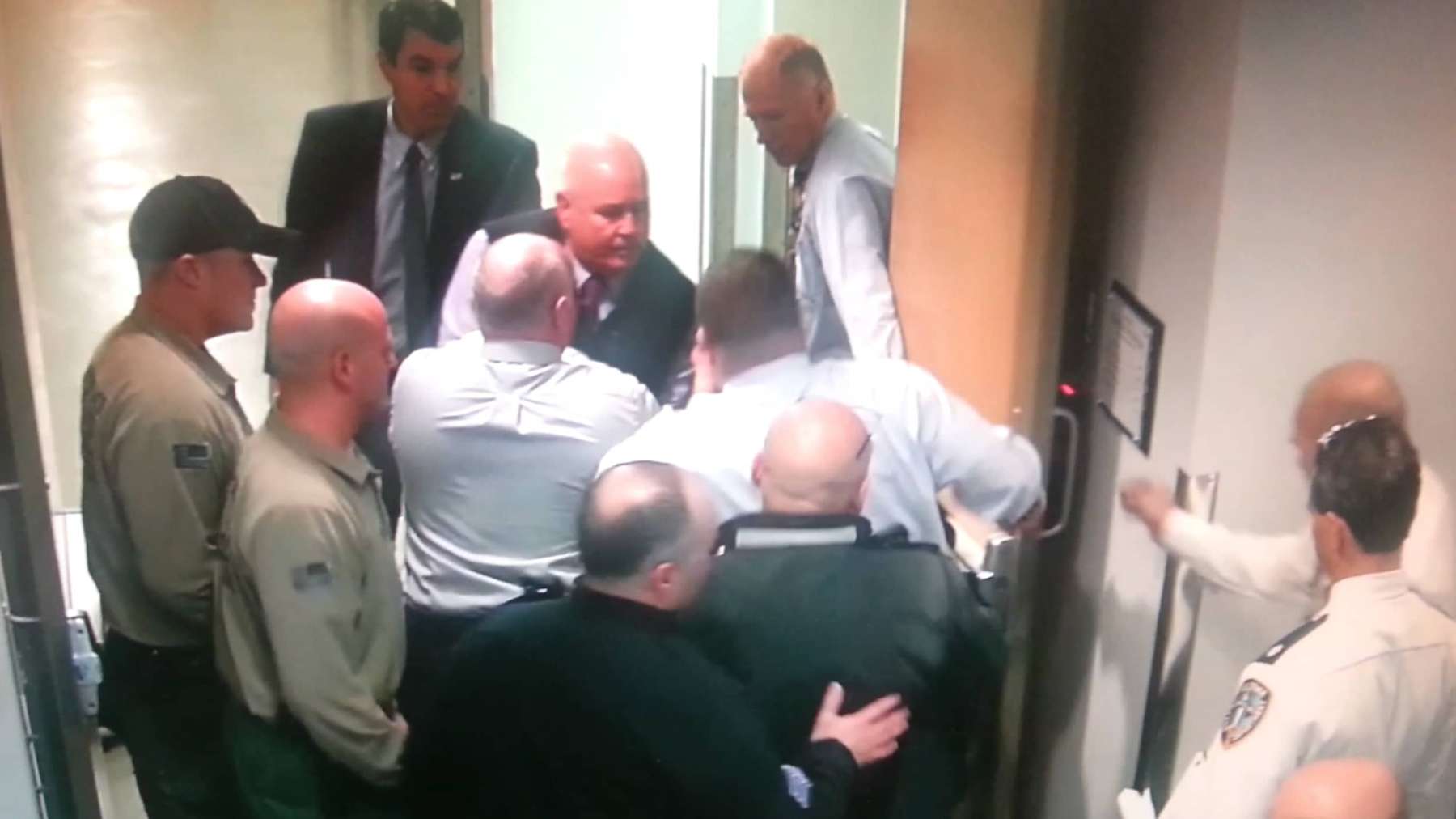A domestic violence survivor seeking assistance was instead assaulted by Providence police officers, lawsuit alleges
Simone Phoenix was attempting to access services for survivors of domestic abuse, and ended up assaulted by police, detained, and “maliciously” prosecuted, according to a lawsuit filed in federal court Content warning: this story, and the embedded video, contain depictions of physical assault and police violence. Simone Phoenix walked into the Providence Public Safety Complex on Jan. 23, 2017 trying
September 21, 2020, 8:59 am
By Julia Rock
Simone Phoenix was attempting to access services for survivors of domestic abuse, and ended up assaulted by police, detained, and “maliciously” prosecuted, according to a lawsuit filed in federal court
Content warning: this story, and the embedded video, contain depictions of physical assault and police violence.
Simone Phoenix walked into the Providence Public Safety Complex on Jan. 23, 2017 trying to pick up an application for emergency housing assistance after surviving domestic abuse by her ex-husband. Instead, she was assaulted by five police officers, detained for hours, and transferred involuntarily to Rhode Island Hospital.
“When I walked into the Safety Complex, never in a million years did I think I would be held captive,” Phoenix told me. “I thought I would walk away with a feeling of safety and content, that everything was going to be okay, and I would move on and move forward with my life.”
Furthermore, the Providence Police charged her with misdemeanor assault and damage to property––charges that carry up to four years in prison and $4,000 in court costs. Months later, the police dismissed the charges.
This March, Phoenix filed a lawsuit in federal court against the police officers who allegedly assaulted her, the City of Providence, and Day One and Family Service of Rhode Island––the organizations that were helping find Phoenix emergency housing after her assault. All named defendants declined to comment on the lawsuit.
The case is particularly troubling to civil rights lawyer Shannah Kurland, who is representing Phoenix in the case, because of the alleged role of the organizations that were supposed to be helping Phoenix. “What is so egregious about this case is the complicity of the social services agencies that are supposed to be helping survivors,” Kurland told me, “not criminalizing them.”
The series of actions that ended with Phoenix’s assault at the hands of police began earlier in January, when Phoenix survived domestic abuse from her then ex-husband for the last time. On that occasion, her husband was arrested and charged with felony assault, leaving Phoenix and her six-year old son on their own, according to the lawsuit.
After the assault, Phoenix said she received a call from Deborah Silva, a Law Enforcement Advocate (LEA) working for Day One, a private non-profit organization that works with survivors of sexual assault. Day One receives federal funding through grant programs administered under the Violence Against Women Act, and funding from the Rhode Island Department of Public Safety, including $232,437 for its Law Enforcement Advocate program in 2019.
Every police department in Rhode Island has a Law Enforcement Advocate, either employed by Day One or a similar Rhode Island organization, who works with survivors of sexual assault who have been referred by law enforcement, according to Maureen Philbin, the Chief Operating Officer of Day One. Day One has Memoranda of Understanding with police departments defining these relationships, but the Providence Police declined to comment on this story citing the pending litigation, and a public records request for the MOU is yet to be answered. (Philbin declined to comment on any aspect of the lawsuit.)
Silva told Phoenix that she could apply for emergency housing funding, and hoping to find a new place to live with her son, Phoenix agreed to pick up the necessary forms to apply, according to the complaint. The forms were housed at the Providence Public Safety Complex, Phoenix was told.
When Phoenix showed up at the Public Safety Complex, she was greeted by Silva, who told her she had to answer some questions to be eligible for the emergency funds. “We went up to her office, and she said she had some questions, to see if I could qualify for this assistance, which I thought I already did,” Phoenix told me. But she followed Silva to her office. “At no point did [Silva] address privacy policies, consent to treatment, or even explain the parameters of this impromptu screening, much less review or provide Ms. Phoenix with any forms or documentation,” according to the complaint.
After asking a series of questions, Silva asked if she could bring another individual into the office, the complaint says. (This individual worked for Family Services RI, according to Kurland.)
At one point during the questioning, the complaint states that one of the advocates told Phoenix she needed “a mental health vacation.” Phoenix told me that “I don’t really think they understood me. I feel like there was a cultural barrier.” Unclear about the purpose of the questions and whether she was going to be directed towards a means of accessing assistance, Phoenix asked if she was free to leave the office, and was told she was, according to the complaint.
“I noticed on my way to the elevators to leave that [the Family Services of RI clinician] was walking with a few detectives…no one said ‘hey, stop, where are you going,’ so I just kept on going, but I felt very uneasy,” Phoenix told me.
Phoenix encountered two police officers in the elevator. A third officer, who is named as a defendant in the complaint, came up behind Phoenix and told her she could not enter the elevator, because Silva and the Family Services of Rhode Island clinician had said she needed to stay. “I was shocked,” Phoenix told me, “as a victim of domestic violence, I wouldn’t expect you to tell me that I am now a criminal.”
Video footage (below) from a camera in the Public Safety Complex shows Phoenix leaving the elevator. The scene quickly escalates: the complaint states that Phoenix told police officers, as they attempted to grab her, that she suffered from PTSD as a result of her abuse, which would be triggered by unwanted touching by men. “They were obviously disregarding what I was telling them,” Phoenix said. “I’m informing you that I’m here as a victim, but you’re turning away and making it something else.”
The video shows that three officers surrounded Phoenix, and one reached out to grab her arm. Phoenix attempted to resist, and two more officers grabbed her, quickly escalating to the point where five men tackled her to the ground.
After Phoenix was handcuffed, one officer grabbed her hair, while others forced her down the hallway as she resisted, as the complaint alleges and is confirmed by the video.
Phoenix was then handcuffed and detained in the public safety building for three hours, before being transferred to Rhode Island Hospital at the request of police, where she was again held in custody because “officers told hospital personnel that she was suicidal,” according to the complaint.
Phoenix and the complaint say that when the clinicians asked whether she was thinking of harming herself during the office meeting, she said no. Photographs taken at the hospital and provided to me show significant bruising on Phoenix’s arms and legs, as the complaint says.
Phoenix was charged with four counts of misdemeanors, and required to appear in court on five occasions, according to the Rhode Island Judiciary portal. This caused the trauma of the assault to continue for months: “Each court appearance and every related conversation with family, employer, and counsel caused Ms. Phoenix to endure vivid and disturbing recollections of the trauma she suffered during the interrogation, assault, and false arrest by Defendants,” the complaint says.
The lawsuit is now in the discovery phase, meaning that both sides are handing over evidence as the case moves to a trial.
But beyond the lawsuit, Phoenix hopes her story will have a broader impact: “instead of treating mental health issues as an illness, it’s being viewed as a crime,” Phoenix told me. “I hope this is a catalyst for change.”







